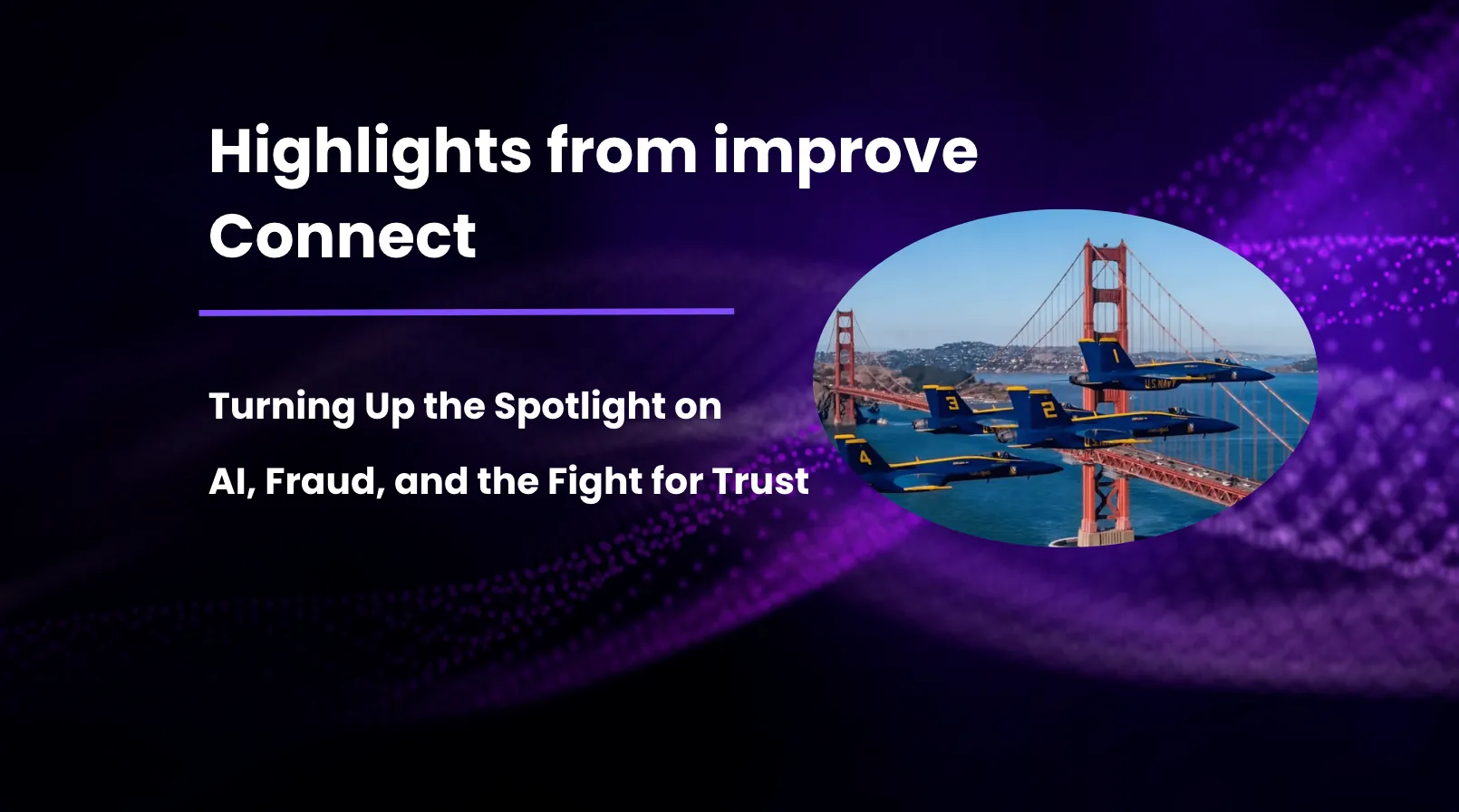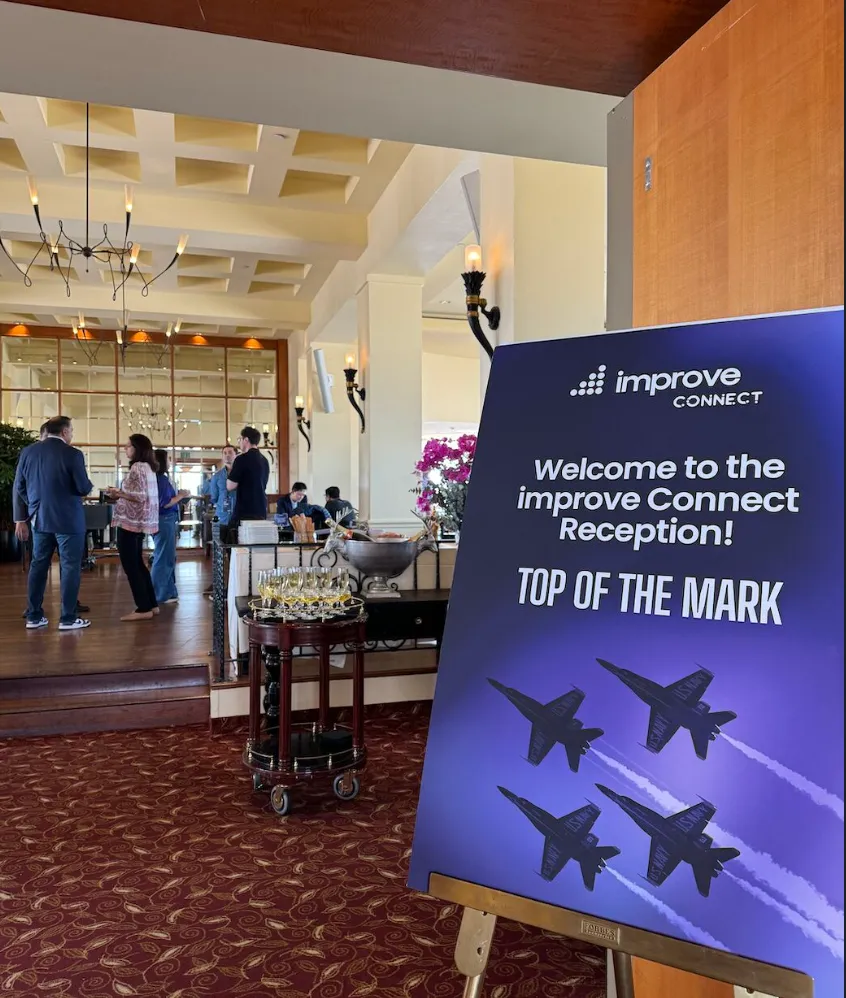AI, Fraud, and the Importance of Trust & Safety: Highlights from improve Connect


Journey sang about the lights going down in the city, but Prove turned up the spotlight on the future of identity and trust last week at improve Connect, our exclusive gathering of the brightest minds in trust & safety, risk, and identity.

More than 100 of the top fraud, risk, identity verification, and customer experience leaders gathered at the InterContinental Mark Hopkins to discuss the most pressing topics facing the industry today, including accelerating digital trust, the role of identity verification in trust & safety, the need for hyper-personalization, and the implications of generative AI.
Speakers from Coinbase, Bluevine, Google, JP Morgan Chase, and others explored the impact of emerging technologies on identity and trust, examining how businesses can adapt to consumers' demands for faster experiences while combating criminals who employ AI and other next-gen methods to execute fraud at an unprecedented pace. The event concluded with a reception at Top of the Mark, where attendees enjoyed front row seats to the Blue Angels Air Show.
Building a Foundation of Trust in a Digital World
Prove's CEO, Rodger Desai, kicked things off with a powerful keynote address that emphasized the critical importance of trust in today's digital landscape. He highlighted the growing need for individuals and businesses to operate within secure ecosystems, stressing that trust and safety are at the core of every successful online interaction.
Rodger painted a stark picture of the challenges we face, citing the rise of scams, fraud, and data breaches that erode trust and create anxiety for consumers. He underscored the far-reaching consequences of this erosion, impacting businesses, individuals, and society as a whole.
However, his message was not one of despair but of action. He called upon the audience to take responsibility for rebuilding trust, framing it as both a strategic imperative and a moral obligation.
Prove is a key player in this effort, and Rodger highlighted our role in providing tools for digital identity verification, customer onboarding, and passwordless experiences. He emphasized that Prove's core mission is to create a foundation of trust and safety for businesses, individuals, and entire ecosystems.
Rodger closed his keynote with a call to action, acknowledging the dedication and expertise of the professionals in the room. He expressed confidence in their ability to tackle the challenges ahead and create a safer, more trustworthy digital world.
Accelerating Digital Trust Starts Now
Attendees also got to learn more about Coinbase, a leader in the cryptocurrency space. As Akash Shah, Coinbase’s Head of Product and Platform, explained, the company faces a constant challenge: providing an effortless user experience while maintaining the highest levels of security and trust. This delicate balance was a key theme explored in a fireside chat with Akash and Rodger.
Akash emphasized Rodger’s commitment to compliance and user protection, recognizing that these are paramount in the evolving world of Web3. However, Coinbase isn't just meeting the baseline – they're actively seeking innovative solutions to enhance security and differentiate themselves. This includes a focus on identifying reliable signals that can cut through the noise and streamline identity verification.

One of the major concerns raised was the trustworthiness of incoming data, particularly in the age of sophisticated deepfakes. Coinbase highlighted their multi-layered approach, which combines advanced technology with human expertise. While AI plays a crucial role, manual reviews conducted by trained professionals provide an additional layer of security, catching threats that might slip through automated systems.
Coinbase is using the Prove Pre-Fill® solution, and according to Akash, it creates a "buttery smooth" onboarding experience, reducing friction and increasing conversion rates. By shifting the trust from user-inputted information to verified data, Prove helps simplify the process for users but also strengthens security by preventing fraudsters from exploiting stolen identities.
The session highlighted the importance of real-world examples in driving productive conversations. Coinbase shared instances where high-value users, even billionaires, were initially flagged as potential fraudsters due to their transaction patterns. These anecdotes underscore the need for solutions that can effectively balance security with a seamless user experience.
Navigating the Onboarding Tightrope - Balancing Speed, Security, and Satisfaction
Prove’s Chief Business Officer, Catherine Porter, led an enlightening conversation with Bluevine's Chief Risk Officer, Mira Srinivasan, which focused on the critical role of onboarding in the financial services industry. Bluevine offers a range of banking solutions for small businesses, including checking, lending and credit. Customer onboarding for small businesses is a critical step to build trust, meeting compliance and foster customer satisfaction. With this, Catherine and Mira discussed the need to strike a delicate balance between providing a seamless customer experience and maintaining robust security, particularly as Bluevine expands its offerings beyond lending and into banking.
Mira highlighted the importance of building a skilled team and implementing operational risk controls to address the evolving challenges of onboarding and fraud prevention. She stressed the need to meet high customer expectations for personalization without introducing friction, a challenge that is particularly acute in digital-only journeys where customers expect a consistent and efficient experience.
Looking ahead, Mira outlined a future where onboarding strategies prioritize precision and scalability. Leveraging data availability and strong modeling will be crucial for distinguishing legitimate users from bad actors. She also emphasized the ongoing need to stay ahead of fraud innovation, constantly adapting to new tactics and leveraging data to anticipate emerging threats.
Mira acknowledged the growing sophistication of fraud, particularly first-party fraud, which exploits gaps and makes detection more challenging. Bluevine utilizes AI to enhance models, identify patterns, and streamline processes, enabling them to maintain a lean team while effectively combating fraud at scale.
Mira emphasized the importance of protecting customers and their financial assets and enabling them to transact with trust. This focus led Catherine to talk about Prove Verified UsersSM, our solution that is designed to foster trusted digital environments, enabling safe commerce and safe transactions for financial institutions like BlueVine.
A key differentiator for Bluevine, according to Mira, is their efficient onboarding process, which provides customers with immediate access to money movement after setup. This focus on speed and efficiency fosters customer loyalty and satisfaction.
Finally, Mira discussed Bluevine's commitment to responsible AI implementation. AI is used to improve operational efficiencies and customer communication, but the team prioritizes fairness in AI decision-making, ensuring that model variables do not lead to discrimination.
The Generative AI Revolution: Navigating the Opportunities and Risks for Trust & Safety
The rise of generative AI presents both exciting possibilities and unprecedented challenges for trust and safety professionals. The event concluded with an engaging panel discussion led by Prove’s VP of Client Experience, Mary Ann Miller, which featured experts Anish Das Sarma (ML Engineering Leader at Google), Akash Shah (Head of Product and Platform at Coinbase), Sridhar Kotamraj (Head of Product - Identity & Authentication at JP Morgan Chase), and Hal Granoff (VP of Strategy at Prove).
The panel acknowledged the explosive growth of generative AI and its accessibility, which unfortunately extends to fraudsters. With the ability to easily generate convincing text, images, and videos, bad actors can now scale their operations at an alarming rate. This puts trust and safety teams constantly on the defensive, requiring them to adapt quickly and anticipate new threats.
The conversation also touched upon the regulatory and ethical concerns surrounding AI, including its potential impact on existing regulations like GLBA and the risk of bias in AI models. The panelists emphasized the importance of explainability and transparency in AI decision-making, stressing the need for responsible use and careful monitoring to avoid unintended consequences.
A key takeaway was the need for the "good guys" to innovate and stay ahead of the curve. While fraudsters operate without the same constraints, businesses must navigate budgets, regulations, and the inherent complexities of AI implementation. The panelists stressed the importance of collaboration between industry players, regulators, and vendors to establish effective guardrails and ensure responsible AI development.
The discussion also highlighted the importance of building diverse teams with expertise in data science, machine learning, and fraud prevention. Having a "fraudster mindset" on the team was deemed crucial for anticipating and mitigating emerging threats.
The panelists acknowledged that we are still in the early stages of understanding the full potential of generative AI. They encouraged experimentation and a "spaghetti at the wall" approach to explore new use cases and applications.
Wrapping up in the City by the Bay
As the sun began to set over San Francisco, the day culminated in a special reception held at the iconic Top of the Mark, a renowned lounge perched on the 19th floor of the InterContinental Mark Hopkins Hotel.
.webp)
With panoramic views of the city skyline and the shimmering bay as a backdrop, guests enjoyed cocktails and conversation, reflecting on the insightful sessions and valuable connections made throughout the day.
The highlight of the evening was undoubtedly the breathtaking sight of the Blue Angels soaring through the sky, their impressive aerial maneuvers leaving the crowd in awe. It was a fitting end to an event dedicated to innovation and pushing the boundaries of what's possible.
We can’t wait to build upon the improve community with our customers and prospects in 2025!

Keep reading
 Read the article: Why Prove Matters When Identity Data Leaks Become Critical Infrastructure Failures
Read the article: Why Prove Matters When Identity Data Leaks Become Critical Infrastructure FailuresAs large-scale data breaches expose billions of identity records, traditional identity verification and KYC models fail under automated fraud, making cryptographically anchored, persistent digital identity critical infrastructure.
 Read the article: How Prove’s Global Fraud Policy Stops Phone-Based Fraud Others Miss
Read the article: How Prove’s Global Fraud Policy Stops Phone-Based Fraud Others MissLearn how Prove’s Global Fraud Policy (GFP) uses an adaptive, always-on engine to detect modern phone-based threats like recycled number fraud and eSIM abuse. Discover how organizations can secure account openings and recoveries without increasing user friction.
 Read the article: Prove Supports Safer Internet Day: Championing a Safer, More Trustworthy Digital World
Read the article: Prove Supports Safer Internet Day: Championing a Safer, More Trustworthy Digital WorldProve proudly supports the goals and initiatives behind Safer Internet Day, a worldwide effort that brings together individuals, organizations, educators, governments, and businesses to promote the safe and positive use of digital technology for all, especially young people and vulnerable users.












